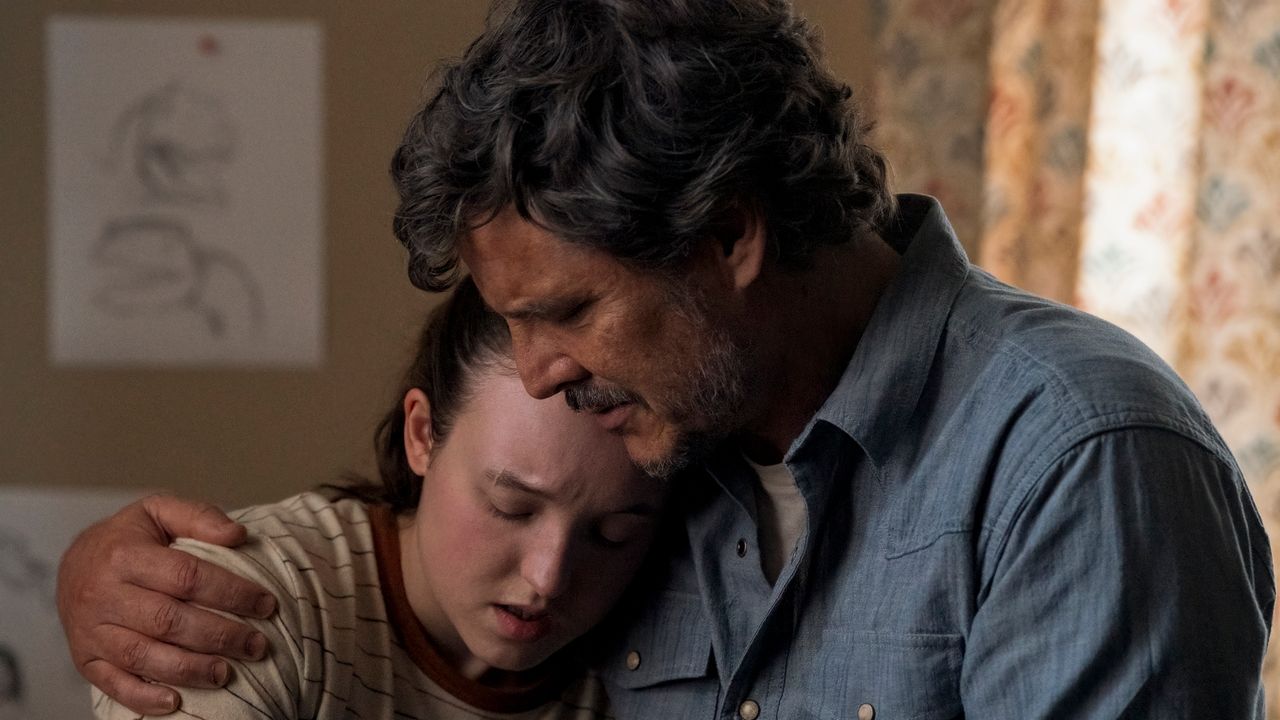What happened between Joel (Pedro Pascal) and Ellie (Bella Ramsey)? That question has lingered throughout season two of The Last of Us. From the beginning of this sophomore outing, an unspoken tension has lingered over the interactions between the two series leads. Now, with this week’s episode, a flashback that fills in the gaps of this season’s five-year time jump, we know why. Using Ellie’s birthday as a narrative device, the Neil Druckmann-directed episode shows us the slow deterioration of Ellie and Joel’s relationship, culminating in Ellie catching Joel in a lie about why he killed Eugene (Joe Pantoliano), which prompts her to start asking real questions about what Joel really did to save her from the Fireflies at the end of season one.
The episode starts and ends with narratives about what parents do to protect their children, something that The Last of Us co-creator Druckmann knows a lot about. Throughout his work at Naughty Dog—the gaming studio behind such PlayStation hits as The Last of Us, Uncharted, and more—he’s returned repeatedly to stories about familial bonds. As such, this week’s installment, co-written by Craig Mazin and Halley Gross, was the ideal moment for him to return to the director’s chair.
With only one episode left before the second-season finale, GQ sat down with Druckmann over Zoom to talk about shooting this episode, why the show tapped Better Call Saul’s Tony Dalton to play Joel’s father, and the significance of Joel’s beloved watch.
GQ: How did you land on directing this episode?
Neil Druckmann: This was something I thought a lot about. I have very limited time. I talked with Craig, I talked with, actually, Pedro quite a bit, and it felt like this episode in particular, 2×06, got into the heart of this entire story, of the core relationship of Ellie and Joel. What they’re talking about, especially on that porch scene, is really speaking to the themes of everything we’ve done and things we’re going to do in the future. I was also excited to do an episode that had no action—it was just all drama. I felt like I could really stretch myself as a director.
Did Pedro shoot this before he left? Or did he come back for this one?
He left for a while. We shot the other episodes between two and six, and then he came back specifically for this episode. He was generous enough to clear his schedule, and we had a healthy amount of time to shoot this episode with him.
What was it like to have him back on set and be there with him after so much time away?
Pedro’s become a friend. He’s very charming as you see [laughs], and he’s that way in real life. It was exciting, but pretty quickly it became about the work. Focusing and knowing that this is our last bite of the apple with him and making sure that we honor the character as much as we can. This character means so much to myself and so many of us on the gaming side, on the show side. I think that’s why everybody brought their all. I love the performance that he gave in this episode.
What did you learn from your first stint from directing in season one that you were able to bring into this one?
Oh my God, so much. There’s a lot of overlap between directing for video games, especially the games that we do here at Naughty Dog, because they are so cinematic and very story-driven, character-driven. But there’s an order of operations that’s a little bit different. When we shoot for the game, we could still change a lot of things after the fact. I could change all the cameras completely and I still have the performance. The performance exists as data in 3D, so virtually, we could put the camera wherever we want. We could change the lighting after the fact, we could change the set, their costumes, even their props—all that is up for grabs even after we shoot.
On the show side, you do all this prep months in advance. That space capsule sequence, we were working on months before I even arrived, just talking through the plan, what’s that going to look like, how that’s going to be. Then, as you get closer, you start rehearsing things if there’s any sort of stunt or any special effects — It just gets more and more intense as you get close to the day of shooting, whatever it is you’ve been working on.
Then you say “action” and you hold your breath, and then you say “cut.” When it all works, it’s pretty incredible because all that work you caught on camera—except for some exceptions with VFX— what you got is what it is. It’s very, very high stress and there’s not a lot of leeway to fix things after the fact. I learned—I mean, I already knew this from season one, but it was reinforced going to season two — I want it to be as prepped as possible. I wanted to storyboard as much of it as possible to do all my scene preparation, everything beforehand. I wasn’t going to leave anything to chance.

